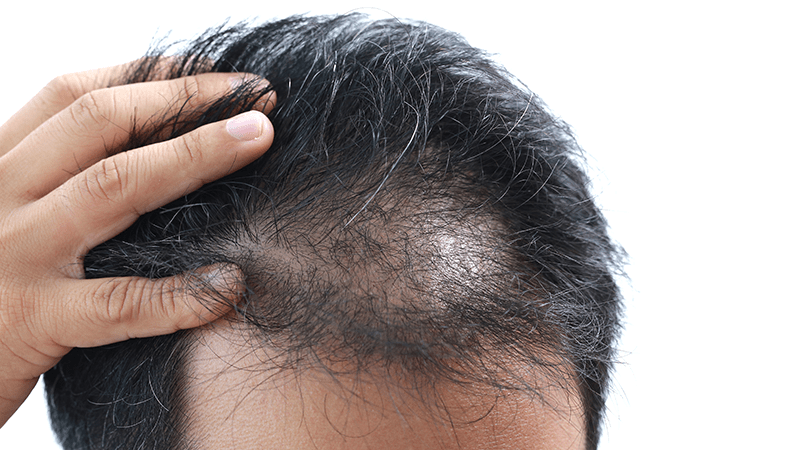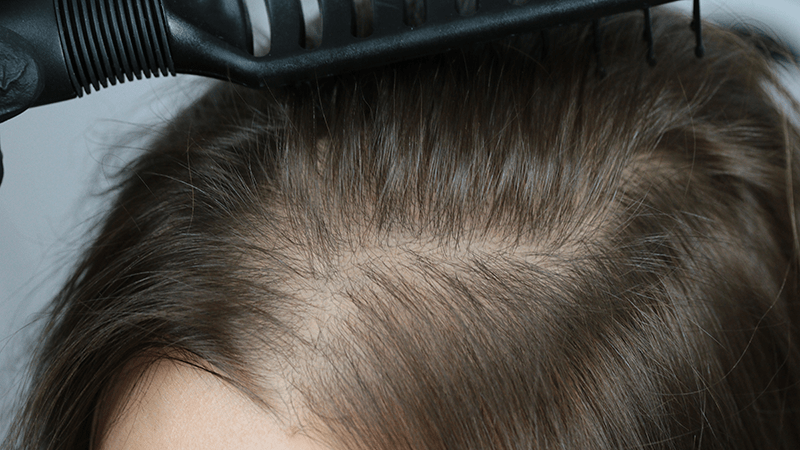Hair grows in cycles. When it falls out, the roots usually remain in the scalp and new hair grows out of them. On average, we lose up to 100 hairs a day. It’s only when more hair than that is regularly falling out that we start talking about alopecia, or hair loss. With diffuse alopecia, the area of hair loss is not clearly defined. Instead, the hair gets thinner all over the head and the scalp starts to show through. Like with alopecia androgenetica, diffuse hair loss is usually genetic. In some cases, diffuse hair loss can also be a symptom of an underlying illness or nutrient deficiency.
A doctor can determine the causes of diffuse hair loss
With diffuse hair loss, unlike with androgenetic hair loss, more women are affected than men. If you notice you’re losing more hair than before, it’s a good idea to go to the doctor. He or she will be able to tell you if you’re suffering from diffuse hair loss, and try to identify the cause. It’s helpful for the doctor to know the following information:
- Have you been ill in the last few weeks or months?
- Have you taken any medication?
- Do you use hormonal contraception, and has anything about that changed recently?
- Are you on a diet?
- Have you changed the way you eat recently?
- Are you under greater stress?
The answers to these questions will often enable the doctor to make an initial assessment. Further investigations may include comprehensive blood tests.
Common causes of diffuse alopecia
The sudden onset of hair loss can have various causes. In some cases these causes can be easily remedied, or may even go away by themselves.
Skin diseases: A fungus, a virus, a bacterial infection, eczema or psoriasis can lead to hair loss.
Hormones: One common reason for hair loss is hormones. Hair loss can occur following pregnancy or while using hormonal contraception – when you stop using a particular contraceptive, for example, or switch to a different one. Hair loss is common following the menopause, too, although this can also be hereditary. To the naked eye, it’s hard for a layperson to tell the difference.
Thyroid gland: The thyroid gland plays an important role in your metabolism. If you have an overactive or underactive thyroid, it can visibly affect your hair growth.
Nutrient deficiency: In some cases, diet can contribute to diffuse hair loss, especially when there are other factors at play too. An adequate intake of vitamins and nutrients is important for healthy hair. If nutrient intake is disrupted, due to bowel disease for example, or if too few nutrients or vitamins are consumed due to a bad diet or an eating disorder, this can lead to diffuse hair loss.
Illnesses and medications: Diffuse hair loss can be a symptom of some illnesses, but it is more commonly a side effect of medications and treatment methods. When people have chemotherapy to fight cancer, for example, they will often lose their hair – not only the hair on their head but also their eyebrows and eyelashes and in some cases all the hair on their body.
Stress: For some people, stress can be a cause of diffuse alopecia. In these sufferers, mental distress has an effect on the hair fibres.
Combating diffuse hair loss
In many cases, as long as you don’t have hereditary hair loss, your doctor will be able to help you and recommend suitable courses of action – your thyroid function can be adjusted, you can change your diet, and you can stop taking a certain type of medication if necessary. If a crash diet is causing a nutrient deficiency, you should abandon it. If stress is the cause, you should try to minimise your stress or find a way of mitigating it. With medication-related hair loss, switching to an alternative drug may help. But you should never stop taking any medication without speaking to a doctor first.
What can be done to combat genetically determined diffuse alopecia?
Unfortunately, if your hair loss is genetic, a doctor will not be able to help you. But if you want to enjoy the appearance of full hair again, there is a great solution: scalp micropigmentation. The procedure is permanent and conceals patches of thinning hair in a long-lasting way.
Find out more about the possibilities of scalp micropigmentation today
Just message us on WhatsApp!

